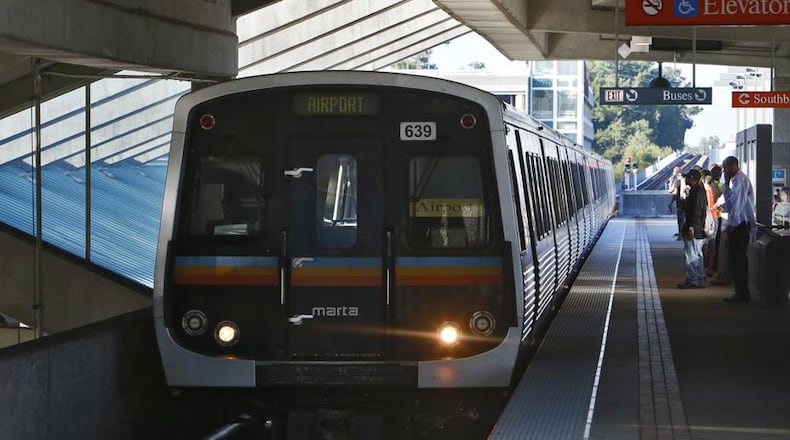MARTA will adopt new plans for transit lines in Clayton and DeKalb counties in the coming months, the agency said Thursday.
Interim CEO Collie Greenwood told the MARTA Board of Directors the agency will seek approval in December for a proposed bus rapid transit line from East Point station in Fulton County to Jonesboro and Lovejoy in Clayton County.
MARTA also plans to adopt a new plan next summer for a long-sought transit line to Stonecrest in south DeKalb County.
The announcement follows visits by political and business leaders from both counties to other cities to experience their transit services. Clayton County officials recently traveled to Indianapolis to see that city’s rapid bus line, which MARTA says resembles its plans for future transit lines. DeKalb officials visited San Diego recently to see bus rapid transit and trolley lines.
Greenwood said the goal of the trips was to “advance critical conversations” about transit lines in both communities. In both cases, the new plans could involve scrapping previous plans for rail lines.
MARTA had planned to build a commuter rail line from East Point to Lovejoy. But those plans fell apart last year because the Norfolk Southern railroad refused to allow the passenger line in its corridor.
Since then, MARTA has asked Clayton officials to consider bus rapid transit for the line. It’s a form of transit that does not yet exist in metro Atlanta but is becoming more common across the country.
Unlike regular local bus service, rapid buses operate mostly in exclusive lanes that allow them to bypass traffic. The service also has features designed to mimic rail service, such as transit stations and preboarding fare payment.
MARTA officials say rapid buses offer service that is comparable to trains but at substantially less cost. Rail advocates say trains offer more dependable service and are the best way to attract economic development.
Clayton County officials were impressed by Indianapolis’ rapid bus line. Following the trip, the county commission adopted a resolution formally asking MARTA to change its preferred alternative for the East Point to Lovejoy line to bus rapid transit.
Greenwood said a MARTA Board committee will consider making the switch in November, with a full board vote set for December.
The future of transit in south DeKalb is less certain.
MARTA has long planned to extend its heavy rail service in the direction of what’s now the city of Stonecrest. But because of the high cost and a lack of local funding, that line has not materialized. In recent years DeKalb officials have disagreed over whether to push for heavy rail or to pursue bus rapid transit.
During a recent town hall meeting, DeKalb political leaders stressed that it was time “to make a decision” on transit in southern DeKalb. County Commissioner Mereda Davis Johnson, who organized the meeting, made it clear what she thinks that decision should be.
“We don’t want to hear about light rail. We don’t want to hear about BRT,” Davis Johnson said. “The only thing that we want to hear about is how are we going to be connected to the heavy rail that comes to south DeKalb.”
Other DeKalb officials have been just as passionate about transit in south DeKalb — but have taken less of a hard line on heavy rail.
The recent trip to San Diego, which highlighted the city’s bus rapid transit and light rail options, was evidence of that. Among those who attended were commissioners Robert Patrick, Lorraine Cochran-Johnson, Larry Johnson and Ted Terry.
In a news release about the visit — issued just hours before Davis Johnson’s meeting — Terry called San Diego “a model we should look to as we work to expand and enhance MARTA’s offerings.”
Whatever option MARTA picks will require a local match for crucial federal funding. Greenwood said MARTA will work with DeKalb officials in coming months to develop a plan for funding the transit line.
Any plan is likely to require voter approval. Transit expansions in Clayton County and Atlanta were made possible when voters approved new transit sales taxes.
Keep Reading
The Latest
Featured





